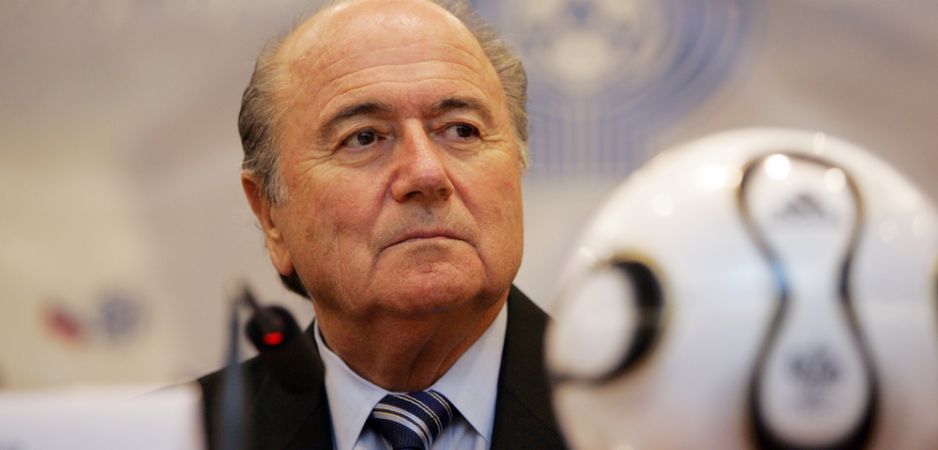FIFA and Sepp Blatter are used to annual meetings that run like clockwork. But US and Swiss police have made sure this time it’s different.
FIFA’s annual meetings are normally formulaic affairs where everything goes to plan: grand speeches are held; pats on the back are summarily dished out; and, most importantly, FIFA President Sepp Blatter gets what he wants. This year’s annual congress, currently taking place in Zurich, looks like it will be different.
On May 27, in the early morning, several members of FIFA’s powerful executive committee were taken from their lodgings, the salubrious Baur au Lac hotel in Zurich, and arrested with a view to being extradited to the United States on corruption charges. Blatter was not arrested and he is “not involved,” said a FIFA spokesman.
According to US authorities, the charges range from racketeering to money laundering and appear to largely center round the affairs of CONCACAF — one of the six regional bodies that come together to govern the world game — and how their officials dealt with marketing rights, advertising contracts and media deals surrounding a number of CONCACAF tournaments.
Intriguingly, the US indictment also mentioned the bidding process to host the 2010 FIFA World Cup. Swiss authorities have seized electronic data and documents from FIFA’s head office in Zurich as part of a probe into suspected “criminal mismanagement and of money laundering in connection with the allocation of the 2018 and 2022 football World Cups.”
FIFA spokesman Walter de Gregorio has tried his best to see the positive in the drama of rich and powerful men being hauled from their beds and threatened with serious charges. He told reporters: “This for FIFA is good. It is not good in terms of image or reputation, but in terms of cleaning up, this is good … It is not a nice day, but it is also a good day.” He also said that Blatter, although relaxed, “is not dancing in his office.”
In terms of FIFA, allegations of corrupt practices are clearly nothing new. Jack Warner, a long-time member of the FIFA executive committee and the principle mover and shaker in CONCACAF — the Confederation of North, Central America and Caribbean Association Football — resigned in 2011 amid a number of corruption allegations, which he has vociferously denied. FIFA ceased internal investigations following his “self-determined” resignation. “The presumption of innocence is maintained,” a release from the organization said. Meanwhile, Warner himself referred to a witchhunt against him.
FIFA has done what many organizations facing fundamental corruption and governance challenges try to do: reform themselves without doing anything about the culture within which the new institutions are set. Defining, let alone changing, culture might well be described as akin to pinning blancmange to a wall. But awareness of the need to follow rules and regulations — and to be transparent about how decisions are made, how resources are allocated and how allegations of inappropriateness are going to be dealt with — are nothing but the basics.
In June 2011, FIFA launched a governance reform process. The notions of transparency and zero tolerance were, so it was announced, to be at the core of a new institutional framework. FIFA, coaxed and cajoled by the respected Swiss legal expert Mark Pieth, introduced a two-tier ethics committee to ensure that the actions of FIFA officials corresponded to the highest moral and ethical standards.
Blatter Battered
FIFA’s inability to deal with the negative fall-out from the bidding processes for the 2018 and 2022 World Cups laid bare how ineffective these processes were. Failed anti-corruption attempts are indeed littered with the corpses of impressive-looking oversight bodies, and FIFA, it quickly became clear, was failing spectacularly.
FIFA didn’t trust independent thinkers enough to allow them to ask difficult questions — it didn’t feel secure enough to bring in genuinely transparent procedures. This is not the terrain for effectively tackling deep-rooted processes of corruption.
The events in Switzerland may indeed prove to be a watershed moment. The sight of FIFA officials being arrested, and the prospect of more and more evidence about the culture that pervaded FIFA becoming apparent may well force the organization to change.
As head of FIFA, Blatter must recognize that the old ways of doing things are out-of-date and, indeed, wholly inappropriate. It is what he does that will be the defining feature of not just the rest of this FIFA annual meeting, but also how the organization moves to tackle corruption.
Football is not now a game played by a few kids in back streets — it is an outsized, cut-throat global business, and it needs to be regulated. As things stand, that isn’t happening. Only when transparency, accountability and a preparedness to allow genuine external oversight are the watch-words of all FIFA’s activities will skeptics really start to believe in the organization again.
*[This article was originally published by The Conversation.] ![]()
The views expressed in this article are the author’s own and do not necessarily reflect Fair Observer’s editorial policy.
Photo Credit: Kojoku / Shutterstock.com / Doha Stadium Plus Qatar / Flickr
 We bring you perspectives from around the world. Help us to inform and educate. Your donation is tax-deductible. Join over 400 people to become a donor or you could choose to be a sponsor.
We bring you perspectives from around the world. Help us to inform and educate. Your donation is tax-deductible. Join over 400 people to become a donor or you could choose to be a sponsor.
Support Fair Observer
We rely on your support for our independence, diversity and quality.
For more than 10 years, Fair Observer has been free, fair and independent. No billionaire owns us, no advertisers control us. We are a reader-supported nonprofit. Unlike many other publications, we keep our content free for readers regardless of where they live or whether they can afford to pay. We have no paywalls and no ads.
In the post-truth era of fake news, echo chambers and filter bubbles, we publish a plurality of perspectives from around the world. Anyone can publish with us, but everyone goes through a rigorous editorial process. So, you get fact-checked, well-reasoned content instead of noise.
We publish 2,500+ voices from 90+ countries. We also conduct education and training programs
on subjects ranging from digital media and journalism to writing and critical thinking. This
doesn’t come cheap. Servers, editors, trainers and web developers cost
money.
Please consider supporting us on a regular basis as a recurring donor or a
sustaining member.
Will you support FO’s journalism?
We rely on your support for our independence, diversity and quality.








Comment